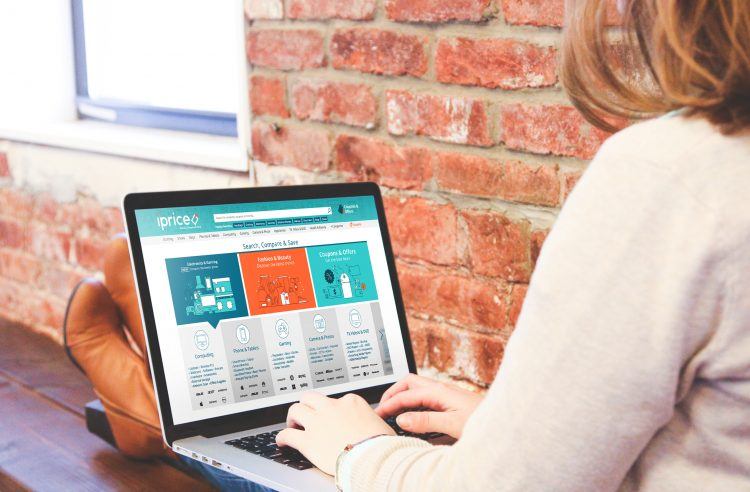
Photo credit: iPrice
Southeast Asia’s business-to-consumer (B2C) ecommerce market was worth US$10.9 billion last year, and will grow to US$88.1 billion by 2025, according to research from Google and Temasek. An array of online marketplaces and retailers are competing against each other for a piece of that pie, trying to tempt online shoppers with special offers, loyalty perks, and lower prices than their rivals.
Kuala Lumpur-based iPrice isn’t content with winning just some of that multi-billion-dollar opportunity. It wants every online shopper to pass through one of its price comparison sites before making a purchase.
“In the next few years, online shopping will become part of everyday life for everyone in Southeast Asia,” said iPrice group CEO David Chmelař. “Our vision is to be the destination where people start their online shopping.”
That lofty ambition has helped iPrice to secure its first injection of growth capital since its US$4 million series A fundraise in December 2016.
The latest round was led by Line Ventures – the VC arm of the Japanese company behind messaging app Line. Singapore-based Cento Ventures and Indonesia’s Venturra Capital also participated. The amount of the investment was undisclosed.
In addition to its home market, iPrice runs price comparison sites in Hong Kong, Indonesia, Singapore, Thailand, Vietnam, and the Philippines.
It aggregates millions of product listings from a range of online stores and marketplaces, allowing consumers to compare prices for the same item and get the best deal. It makes money by driving sales to these retailers, which pay it for every visit that converts into a sale – a model broadly referred to as affiliate marketing.
Since its series A round a year-and-a-half ago, iPrice has expanded its product catalogue from several tens of millions of stock-keeping units (SKUs) to over 500 million SKUs across all its markets of operation.
The startup said that more than 50 million online shoppers have visited its sites over the same timeframe. It’s on track to hit 150 million visitors this year, with much of the increase accounted for by Indonesia – a market which iPrice said has experienced 30x growth over the past 12 months.
Progress made
IPrice faces competition from a host of price comparison sites, such as Pricebook and PriceArea in Indonesia and Priceza in Thailand. These seem to be largely focused on their home markets, however, and don’t have the geographical coverage that iPrice does at this point.
Another rival is Singapore-based Shopback. It also adopts an affiliate marketing approach, though it has been more focused on funneling shoppers through to ecommerce marketplaces with price-reduction coupons and other special offers. It raised US$25 million last November from a group of investors including Credit Saison, Softbank, and Singtel.
According to SimilarWeb, iPrice clocked 1.06 million site visits in Malaysia in March 2018, beating Shopback’s 677,000.
IPrice also pipped Shopback to the post in Indonesia, where the two saw 2.1 million and 2.07 million visits, respectively; and the Philippines, where iPrice’s 1.41 million site visits far outshone Shopback’s 127,000.
The Singaporean startup does get more visits in its home market, however, clocking 737,000 to iPrice’s 541,000.
When Tech in Asia last checked in with iPrice after its December 2016 series A funding, we suggested it needed to offer more to cater to specific audiences and niches. In particular, this might involve collaborating with online publishers to help them monetize their content.

IPrice co-founder and group CEO David Chmelař / Photo credit: iPrice
Chmelař said at the time that, among other things, the company would offer “various front-ends” to consumers. It had also dipped its toe into B2B services for the publishing industry, powering a coupons feature for Philippine news site Rappler. This strategy clearly brings it into closer competition with the likes of Shopback.
Since then, it would appear that iPrice has made progress. In terms of crafting a more targeted service, it recently reorganized its business into three units, covering electronics, fashion, and commercial content.
With regards to the latter, it has expanded on its B2B collaboration with Rappler, securing strategic partnerships with Singaporean media giant Mediacorp and Thai daily newspaper Thai Rath. It is also beginning to offer similar services to brands, with Samsung among the big names it’s working with.
Data-driven insight is another thrust of iPrice’s diversification strategy. The startup’s role as a gateway to ecommerce marketplaces means that it collects a wealth of information on shopper behavior and trends. It has begun to use these insights to produce research reports and market analysis, helping it to cultivate a reputation for thought leadership in the industry. This could attract more clients to work with the firm, and might even become an additional revenue source farther down the line.
This is a developing story. Check back for updates.
This post Ecommerce aggregator iPrice scores fresh funding in Line-led round appeared first on Tech in Asia.
from Tech in Asia https://www.techinasia.com/iprice-line-funding
via IFTTT
No comments:
Post a Comment